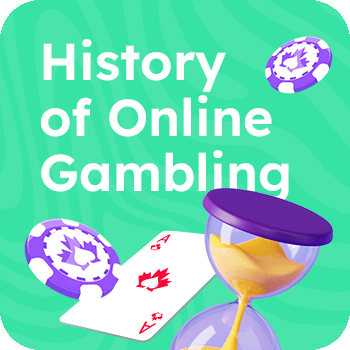 Article Contributors
Article Contributors

 The definition of online gambling is simple. It’s any kind of game that involves wagering money – including poker, casino games, and sports outcomes – which takes place
online betting, as opposed to visiting a physical casino or betting shop . But where did this booming sector originate, and where is it progressing towards? We have developed this section on the history of internet betting to shed light on these questions.
The definition of online gambling is simple. It’s any kind of game that involves wagering money – including poker, casino games, and sports outcomes – which takes place
online betting, as opposed to visiting a physical casino or betting shop . But where did this booming sector originate, and where is it progressing towards? We have developed this section on the history of internet betting to shed light on these questions.
The emergence of the online betting sector began in the mid-1990s . However, it wasn't until the early 2000s that online casinos started gaining recognition as legitimate businesses, implementing measures to ensure player and casino safety .
Since its inception, the online betting field has experienced numerous significant events, with predictions indicating the online casino industry could exceed 94 billion USD by 2024 .
Of course, the practice of gambling has roots stretching far back before the 1990s. Let's take a moment to reflect on how humanity began its gambling journey, before delving deeper into the story of online betting .
History of Gambling

The earliest signs of gambling can be traced back to the Paleolithic era , millions of years ago, when early humans began crafting tools from stone. In ancient Mesopotamia, which encompasses modern-day Iraq, Kuwait, Syria, and Turkey, the oldest known six-sided dice appeared around 3000 BC.
Meanwhile, in China , gambling establishments thrived around 1000 BC. Here, individuals could partake in lottery and domino games, as well as wager on animal fights. Additionally, this is where playing cards were first developed, with their origins dating back to the 9th century.thcentury.
The 17ththe century was a big one for gambling. Poker Today, the immensely popular gambling card game, poker , has its roots in 17th-century Persia, specifically in a game named As-Nas. In 1638, the Italian city of Venice inaugurated the first-ever public legal casino in the Western world, known as Il Ridotto .thOver a century later, in the United Kingdom, Harry Ogden became the first recorded individual to turn a legal profit from legitimate bookmaking services in 1790, offering bets on horse races.
In Canada , up until the 1950s, gambling was technically legal but frowned upon as an undesirable activity. Throughout its history, Canada has witnessed numerous small, illegal casinos emerge, but the nation opened its first official commercial casino in Winnipeg in 1989 , followed by a casino in Montreal in 1993 , with many more to come.
By 2021, it was estimated that around 75 percent of Canadians partake in some form of gambling , with a noticeable shift towards online platforms, allowing players access to a wider selection of casinos and games with just a click. With this context in mind, let's shift gears to the fascinating history of online gambling, which, while more concise, is equally captivating.
In 1994, as the internet became fully commercialized, the Caribbean country of Barbuda and Antigua emerged as the first to establish regulations for online gambling. They issued licenses to companies wishing to provide gambling services through internet casinos, following the enactment of the Free Trade and Processing Act .
History of Online Gambling
 The history of online gambling is much briefer compared to the history of gambling, but it is fascinating to look at it nonetheless.
The history of online gambling is much briefer compared to the history of gambling, but it is fascinating to look at it nonetheless.
So, when did the realm of online gambling actually begin? In 1996, InterCasino was launched as the very first online gaming site, officially kicking off what has grown to be a highly lucrative form of online entertainment. This platform welcomed its initial real-money wager that same year and has since distributed over $3 billion in winnings. Employing Cryptologic , a secure transaction software provider, it devised various methods to ensure safe and secure financial dealings online.
1996 also marked the establishment of the Mohawk Territory Kahnawake Gaming Commission , which was created to oversee and regulate online poker rooms and casinos. In addition, a new Swedish developer emerged, producing some of the most innovative games of that time, providing online players with a vast array of top-tier offerings that included progressive jackpots, slots, live dealer games, and a wide variety of card and table games. Alongside this developer, NetEnt , which was founded around the same time, has remained a major player in the sector.
By 1997, the number of gambling websites catering to online players surged from just 15 in 1996 to more than 200. A report from 1998 indicated that online gambling revenues had already surpassed $834 million . Around this time, several poker rooms launched, with Planet Poker debuting the first online version of Texas Hold’em. Multiplayer gaming followed soon in 1999, allowing online participants to chat and engage in an interactive betting environment.
A few years later, in 2006, the US unexpectedly outlawed all online gambling services , a decision that significantly affected mobile and other online gambling offerings. This strict stance from the US on online gambling amplified the contrast to Canada's more permissive approach , which has proven to be lucrative . Canada is home to the renowned Kahnawake Gaming Commission , which licenses online casinos and poker venues, and has become a central hub for numerous online gaming operators and software developers , making it one of the top gambling destinations globally. NetEnt Moreover, in 2021, after years of deliberation, Canada took a significant step forward by legalizing online sports betting . Isle of Man-based Microgaming Key Milestones in the Evolution of Online Betting
InterCasino , the very first online casino, goes live.
The inaugural Internet poker room makes its debut. The introduction of multi-player gaming allows users to gamble online while socializing. The eCommerce and Online Gaming Regulation Act is established, creating an independent regulatory authority.
The United States Senate approves the Unlawful Internet Gambling Enforcement Act.
Progressive slots see jackpot totals exceed USD $5.5 million.
| 1996 | Bitcoin begins to feature as an accepted cryptocurrency for gaming. |
| 1998 | Microgaming launches Virtual Reality headset games utilizing Oculus Rift technology. |
| 1999 | Canada’s The Stars Group purchases UK-based Sky Betting and Gaming in a billion-dollar acquisition. |
| 2003 | Flutter Entertainment acquires The Stars Group, establishing itself as the largest online gaming enterprise globally. eCOGRA Caesar's purchases William Hill for USD $3.7 billion. |
| 2006 | A staggering win of over €19 million on Absolootly Mad: Mega Moolah sets a record for the largest online jackpot ever claimed. |
| 2008 | Canada officially legalizes online sports betting. |
| 2014 | It's hardly surprising considering the substantial advancements in online gambling over the last 20 years . Back then, choices were severely limited, and casinos struggled to create a realistic experience, relying on low-quality graphics and minimal environments. |
| 2016 | Today, we can see live casino rooms that create the ambiance of real-world casinos, and remarkably designed slots that enthrall players with captivating visuals and engaging narratives. The transformation is recognizable to everyone. In addition, online operators prioritize enhancing the mobile experience by employing the latest technologies to deliver the ultimate gaming experience , whether players are using a computer or a mobile device. |
| 2018 | Many operators are also delving into the possibilities of virtual reality games , which respond to players' actions to further improve their gaming offerings. The first virtual reality casino, SlotsMillion, launched in 2016, with expectations for many similar platforms to arise as the technology advances and interest grows. |
| 2019 | Soon, online players may be able to connect with their favorite characters in much closer proximity through virtual reality; it's conceivable that virtual reality gambling could evolve into the most cherished form of entertainment among online casino enthusiasts in the foreseeable future. |
| 2020 | Will blockchain technology leave its mark on the online gambling sector? |
| 2021 | Blockchain technology is poised to play a pivotal role in the future of online gambling. Today, most online casinos accept Bitcoin and other cryptocurrencies for transactions. Even without considering cryptocurrency, blockchain technology offers a swift, secure solution that benefits both casinos and players with its robust security features. |
| 2021 | The outlook for this industry appears promising, and we eagerly anticipate updating this page with new developments over the coming years! |
The Future Of Online Gambling
 Now that we’ve talked all about the history of online gambling , let’s take a look at what the future holds . The current size of the online casino market was almost 46 billion US dollars in 2019 , according to Statista. And as we’ve already mentioned, the online gambling industry is expected to be worth more than 94 billion US dollars by 2024 . This means that the size is expected to more than double in the coming years – a truly incredible rate of growth unmatched by any other industry!
Now that we’ve talked all about the history of online gambling , let’s take a look at what the future holds . The current size of the online casino market was almost 46 billion US dollars in 2019 , according to Statista. And as we’ve already mentioned, the online gambling industry is expected to be worth more than 94 billion US dollars by 2024 . This means that the size is expected to more than double in the coming years – a truly incredible rate of growth unmatched by any other industry!
Stay Informed With The Latest Casino Updates
Adam Nadeau, our founder, reviewer, and sales director, boasts 19 years of experience in the online gambling field. He founded PlayCasinos from his college dorm room in 2005, initially as a personal blog where he shared his favorite slots and games.
We utilize cookies to ensure a superior experience on our website. By continuing to browse, we assume you're content with our approach.
kahnawake-gaming-commission-logo Logo
kahnawake-gaming-commission-logo
Copyright © 2013 – 2025, ssg-net1.com. All rights reserved.
ssg-net1.com incorporates paid advertising. If you register and make a deposit via our site, we may receive a commission from our affiliates.
19+. Gambling can lead to addiction; please play responsibly. For help, contact +1 (416) 499-9800.









 Fact Checker
Fact Checker


